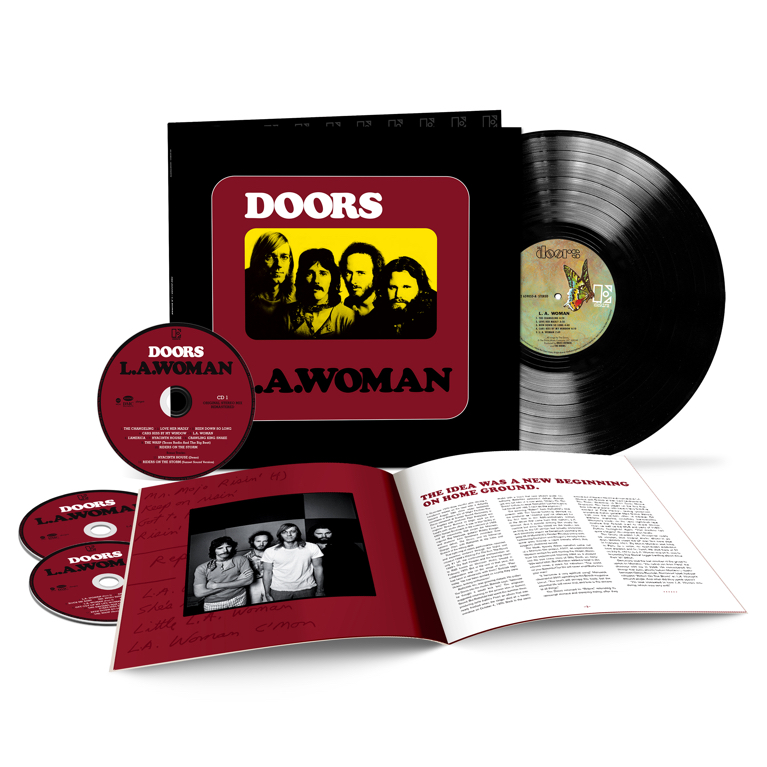L.A. Woman Box Set

Published 2021-09-15 06:00
John Densmore vividly remembers the words longtime Doors producer Paul A Rothchild used to describe “Riders On The Storm”: “Cocktail music”. “When he heard it, it was in an early rehearsal and it hadn’t evolved into what it became”, the drummer says of the dramatic track, a cowboy ghost story set to haunting rain and thunder. “But it really is one of our most important songs”.
The full story of the track will finally be told in an upcoming, 50th anniversary box set reissue of "L.A. Woman, the band’s triumphant final album to feature singer Jim Morrison, due out December 3rd, 2021. Among the bonus tracks that accompany the newly remastered record are the original demo for “Riders”, which the band cut at Sunset Sound and is premiering here, an alternate version of the tune recorded during the "L.A. Woman" sessions, and, of course, the final studio rendition. The collection, which contains 3 CD's and 1 LP, features 18 previously unreleased recordings in total.
“Just recently, Robby [Krieger said he felt that 'L.A. Woman' was the most organically formed album we ever did, because most of the songs were initiated from just jamming”, Densmore says. “Whereas Robby would sometimes bring in a completed song like ‘Light My Fire'.”
When the Doors started writing "L.A. Woman", only a few months had passed since they’d put out their 5th LP, "Morrison Hotel", which had seen the return to a harder, bluesier sound than the pop detours they had taken recently. They wanted to keep the momentum going on "L.A. Woman", and together, they wrote “Love Her Madly”, “L.A. Woman” and “Riders On The Storm”, among other fan favorites on the album, before inviting Rothchild to their rehearsals and eventually recording the rendition of “Riders”, featured here, at Sunset Sound.
The original demo moves a little faster than the studio version, and keyboardist Ray Manzarek played piano bass, as opposed to bassist Jerry Scheff’s performance on the studio version, giving it a rougher, almost electronic feel. Although it features the same power as the "L.A. Woman" version, it didn’t move Rothchild. “Paul put his head in his hands and said, ‘This is cocktail jazz, I can’t do this anymore'”, engineer Bruce Botnick recalls. Rothchild, who had just come off of producing "Pearl" for Janis Joplin, backed out of "L.A. Woman", and the band ended up co-producing the album with Botnick. “With Bruce and us producing, we had more control”, Densmore says. “It was a joy. It only took a few weeks to make”.
While overseeing the reissue, Botnick recently discovered the long forgotten demo on what he called a hub, the aluminum center of a reel that the tapes wound around. That one take was all that was on the unlabeled hub. “We came upon that and went, ‘Oh, my God'”, the producer says. “And the funny thing is, when it got transferred, it got transferred backwards. So I had to flip it electronically, and when I heard it, I went, ‘Holy tamales, look what we’ve got’. We had no idea there was even any aural record of the sessions”.
Later, when the band recorded the more familiar version of the song, Densmore recalls having fun with the sound effects. “I was playing God”, he says. “Jim had left for Paris. He didn’t like mixing anyway. It was too technical for him”. So without Morrison, who can be heard suggesting thunder sounds on a different take of the song, Botnick obtained recordings of rain and thunder that Elektra Records chief Jac Holzman had recorded in New York City one summer. “Bruce had set up the tape machine to play constant ambient rain and thunder, and he had a couple more cued up with thunderclaps, and we could drop a thunderclap wherever the fuck we want”, Densmore says. “So right after a line of Jim’s or a guitar solo, so it was a power trip”. Botnick remembers this differently, saying that they didn’t cue the thunder effects, but that they played one tape and all the thunder occurred at the perfect moment each time by coincidence.
Despite how evocative the song was, neither Densmore nor Botnick can say what inspired Morrison to sing the lyrics he did. But the drummer has a guess, “He had done this film, about a killer on the road, a little sort of student film thing”, he says. “And we were jamming on ‘Ghost Riders In The Sky’, the kind of corny country song. And the guitar part kind of morphed into what we played, but we wanted the same mood, the same eerie, mystical mood, which we nailed”.
After apologizing for what he calls self congratulating, however, Densmore quotes a friend who described the song in a way that struck him as true. “Carlos Santana said that ‘Riders’ has a mystery in it”, he says. “Once again, that’s a blessing”.